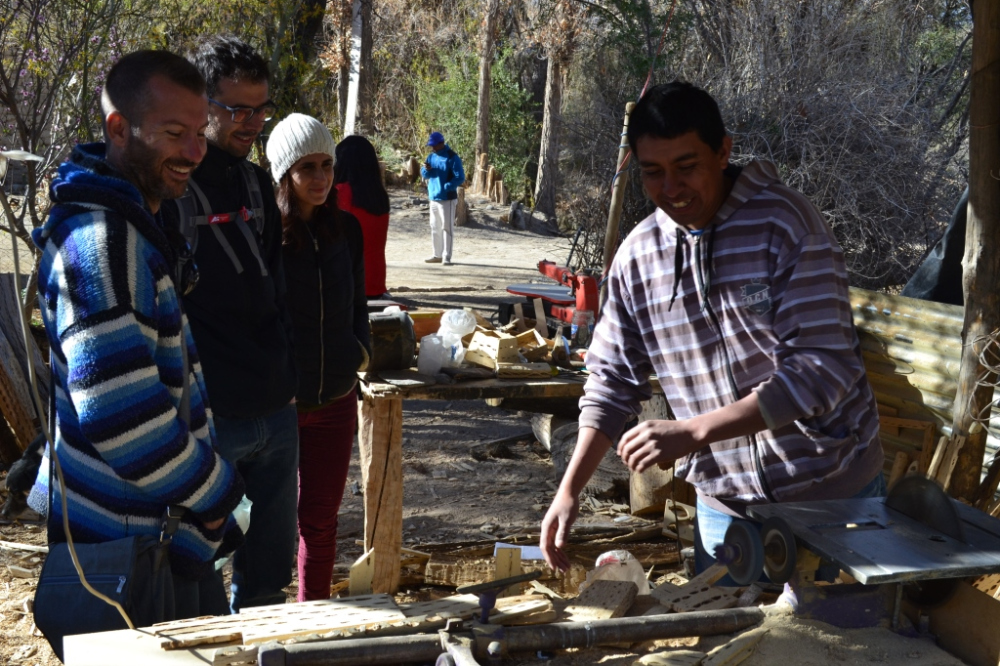
17 Mar 2017 | Focolare Worldwide
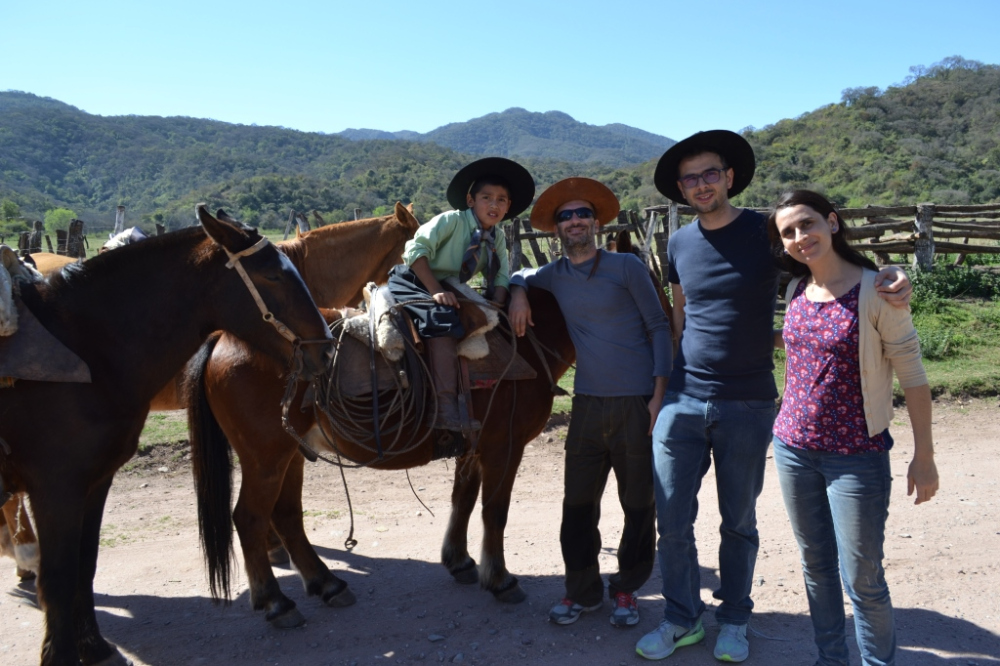 The solidarity tourism project that the Ministry of Tourism of Salta, Argentina has been promoting for six years supports small communities in the cities of Salta, Jujuy and Catamarca in the north of the country. It is enhancing the region’s natural resources in order to save the cultural richness and diversity that is linked to local history. At the same time, it offers professional training for the production of products related to the sectors of tourism, housing, transport and the sale of handicrafts and food products (jams, liqueurs, honey, and more). This has helped to avoid the migration of populations from rural areas to urban ones, preventing the increase of poverty areas in the big cities while protecting small communities that have a rich culture that is disappearing.
The solidarity tourism project that the Ministry of Tourism of Salta, Argentina has been promoting for six years supports small communities in the cities of Salta, Jujuy and Catamarca in the north of the country. It is enhancing the region’s natural resources in order to save the cultural richness and diversity that is linked to local history. At the same time, it offers professional training for the production of products related to the sectors of tourism, housing, transport and the sale of handicrafts and food products (jams, liqueurs, honey, and more). This has helped to avoid the migration of populations from rural areas to urban ones, preventing the increase of poverty areas in the big cities while protecting small communities that have a rich culture that is disappearing. 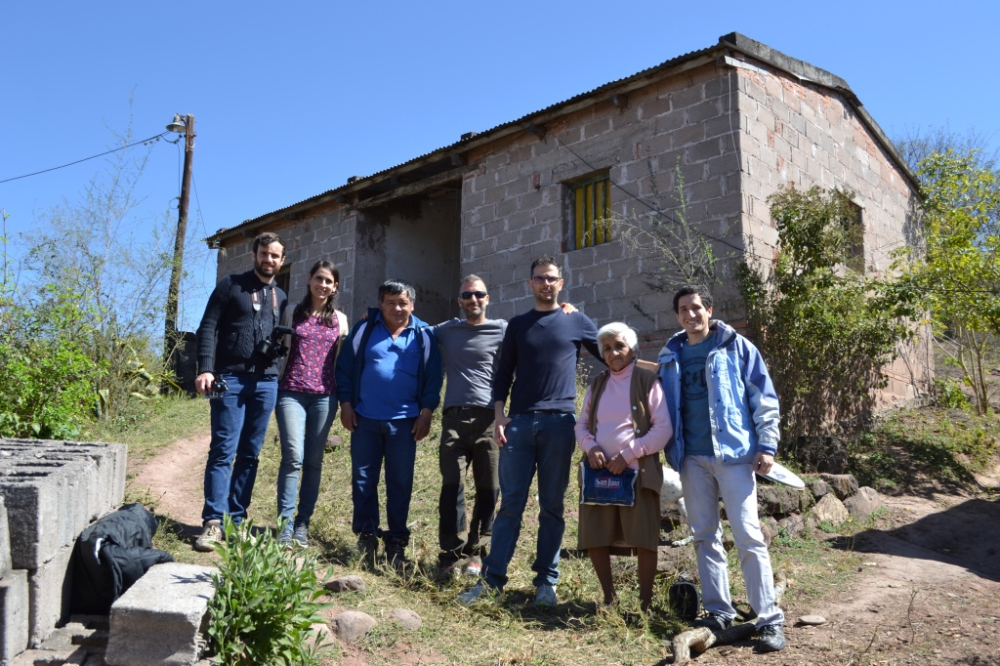 “What distinguishes this experience of development from other types of experiences,” sociologist Virginia Osorio from the Sumá Fraternidad explains, “are the words “communion” and “dialogue”. Communion, because each actor has put his or her own talents and resources in common for the development of the project; dialogue, because throughout the development process, there was strong interaction between the different components who were often in conflict with one another. Difficulties were never lacking, but the strategy used to overcome those difficulties was to work in squads and practice active listening among parties: the local community, the State, businesses and other types of civil organisations.” She went on to say: “The result of this experience has been the birth of a new product and of a new kind of consumer. It’s not the idea of tourism that we have been used to. In this experience there is the added value of contact with the rich cultural wealth of small rural communities and, in several cases, of the descendents of indigenousness peoples. This type of tourism creates encounter among people among people.”
“What distinguishes this experience of development from other types of experiences,” sociologist Virginia Osorio from the Sumá Fraternidad explains, “are the words “communion” and “dialogue”. Communion, because each actor has put his or her own talents and resources in common for the development of the project; dialogue, because throughout the development process, there was strong interaction between the different components who were often in conflict with one another. Difficulties were never lacking, but the strategy used to overcome those difficulties was to work in squads and practice active listening among parties: the local community, the State, businesses and other types of civil organisations.” She went on to say: “The result of this experience has been the birth of a new product and of a new kind of consumer. It’s not the idea of tourism that we have been used to. In this experience there is the added value of contact with the rich cultural wealth of small rural communities and, in several cases, of the descendents of indigenousness peoples. This type of tourism creates encounter among people among people.”  Stefano, a young Italian tourist who participated in the programme, reports: “I feel like for some people travelling is like looking at the world from a glass box. We travel in search of our Western standard, with our comforts, our certainties and securities. We go to “consume,” as if visiting places was like stopping to have a drink and then throwing the cup away. Many photos are taken, many souvenirs are bought, you eat at some local eatery and the game is over! A nation is not made of monuments and souvenirs, but of people that can offer hospitality, sharing their homes, their dinner tables, their music: this is the real way to travel! ‘Share’, Argentina!” The family of María José e Pablo from Argentina recount: “We liked this idea of vacation, taking walks, getting to know sites, but most of all the opportunity to meet these ‘human sites’ that at times are hidden in the background of the postcards … which allowed us to enter into the local reality of those communities. We had the strong feeling throughout this experience of breaking free from our scheme of things and filling our life with those people whom we now hold in our heart; experiencing the profound and tranquil rhythm of those places, and the scenery of many places we passed through on our trip. Now, as we return to the city, we look at daily life differently, with new eyes.”
Stefano, a young Italian tourist who participated in the programme, reports: “I feel like for some people travelling is like looking at the world from a glass box. We travel in search of our Western standard, with our comforts, our certainties and securities. We go to “consume,” as if visiting places was like stopping to have a drink and then throwing the cup away. Many photos are taken, many souvenirs are bought, you eat at some local eatery and the game is over! A nation is not made of monuments and souvenirs, but of people that can offer hospitality, sharing their homes, their dinner tables, their music: this is the real way to travel! ‘Share’, Argentina!” The family of María José e Pablo from Argentina recount: “We liked this idea of vacation, taking walks, getting to know sites, but most of all the opportunity to meet these ‘human sites’ that at times are hidden in the background of the postcards … which allowed us to enter into the local reality of those communities. We had the strong feeling throughout this experience of breaking free from our scheme of things and filling our life with those people whom we now hold in our heart; experiencing the profound and tranquil rhythm of those places, and the scenery of many places we passed through on our trip. Now, as we return to the city, we look at daily life differently, with new eyes.”
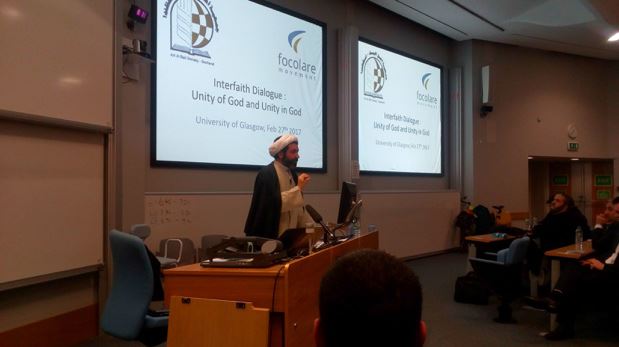
16 Mar 2017 | Focolare Worldwide
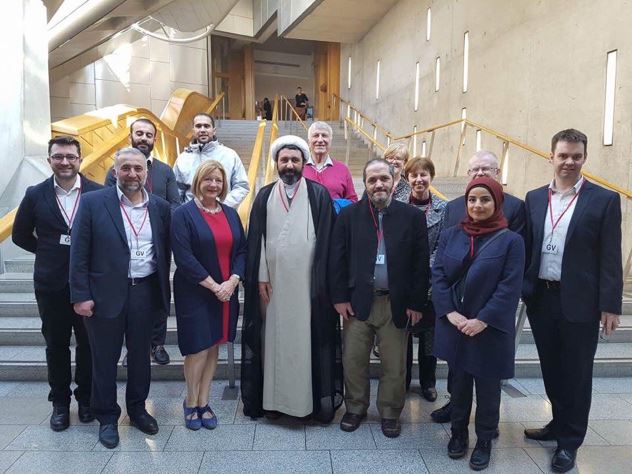 The University of Glasgow, founded in 1451, is one of Scotland’s four ancient universities. In this prestigious place, which educated seven future Nobel winners and heard Albert Einstein demonstrate his theory of relativity, the Focolare Movement and the Islamic society Ahl Al Bait organized an open lesson on interfaith dialogue and unity on 27 February. The evening was entitled “Unity in God and unity of God”. It featured a renowned figure of the Shiite world, Dr. Mohammad Ali Shomali, director of the International Institute of Islamic Studies at Qum, Iran, who currently is at the helm of the Islamic Centre of Great Britain. There was also Professor Paulo Frizzi, teacher of theology and the practice of interreligious dialogue at the Sophia University Institute at Loppiano, near Florence, Italy, where he coordinates the Sophia Global Studies research and training center. The following day, Dr Shomali was to lead a discussion before members of the Scottish Parliament.
The University of Glasgow, founded in 1451, is one of Scotland’s four ancient universities. In this prestigious place, which educated seven future Nobel winners and heard Albert Einstein demonstrate his theory of relativity, the Focolare Movement and the Islamic society Ahl Al Bait organized an open lesson on interfaith dialogue and unity on 27 February. The evening was entitled “Unity in God and unity of God”. It featured a renowned figure of the Shiite world, Dr. Mohammad Ali Shomali, director of the International Institute of Islamic Studies at Qum, Iran, who currently is at the helm of the Islamic Centre of Great Britain. There was also Professor Paulo Frizzi, teacher of theology and the practice of interreligious dialogue at the Sophia University Institute at Loppiano, near Florence, Italy, where he coordinates the Sophia Global Studies research and training center. The following day, Dr Shomali was to lead a discussion before members of the Scottish Parliament. 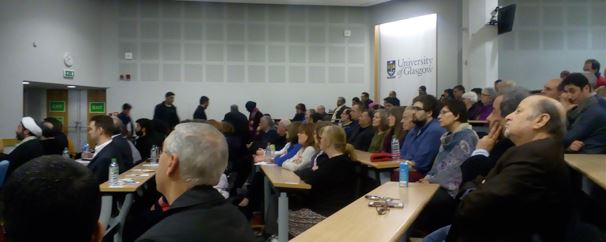 The longstanding friendship between Sophia University Institute and the Shiite academic brought about a dialogue and research project last summer that involved a group of Christian and Muslim scholars, with the suggestive title “Wings of Unity.” “I presented the methodology and atmosphere that our institute promotes, where we work with an academic approach that is integrated, where experience and application is placed alongside the theory,” explains Frizzi. “For example, a course on interreligious dialogue is taught by three of us with different academic backgrounds and experience, yet we try to develop a common program through reciprocal listening, sort of a journey of unity in which we co-teach the lessons and the students play a lead role.”
The longstanding friendship between Sophia University Institute and the Shiite academic brought about a dialogue and research project last summer that involved a group of Christian and Muslim scholars, with the suggestive title “Wings of Unity.” “I presented the methodology and atmosphere that our institute promotes, where we work with an academic approach that is integrated, where experience and application is placed alongside the theory,” explains Frizzi. “For example, a course on interreligious dialogue is taught by three of us with different academic backgrounds and experience, yet we try to develop a common program through reciprocal listening, sort of a journey of unity in which we co-teach the lessons and the students play a lead role.” 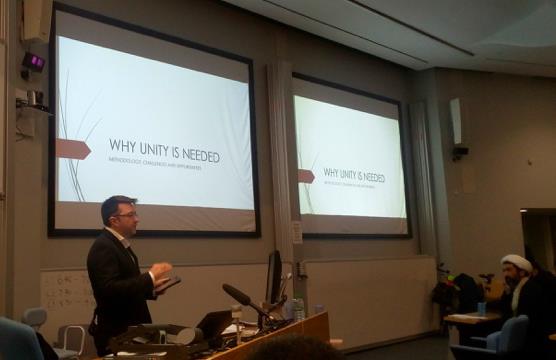 Wings of Unity, explains the Sophia professor, provides a physical space to dialogue, where on one hand students can deepen their understanding of what “unity in God and of God” means, clarifying elements of difference and those held in common. On the other, they can explore the ways in which unity can be tangibly lived, healing wounds and resolving differences. “Too often interfaith initiatives only touch on the questions of the few, without a tangible impact. This is a delicate moment we live in, and we have to take into account the transition towards an uncertain new world order, where greater interconnectivity and interdependence sit alongside painful divisions that fracture the unity of society. Globalization has probably failed in its attempt to build sustainable community, as multinational institutions fail to guarantee a safe space where cultures and religions can meet without the risk of losing themselves. “This may be true, but on the other hand there is experience, commitment and dialogue welling up that, in contrast, enriches neighborhoods and unifies communities. It begins deep down and helps us all think once again of unity amid diversity.” As Pope Francis states in Evangelii Gaudium, dialogue happens in a world that is not a pyramid (where some are at the top over many others) nor a sphere (without any distinguishable sides), but instead multifaceted, where all parts converge together while maintaining its own individuality.
Wings of Unity, explains the Sophia professor, provides a physical space to dialogue, where on one hand students can deepen their understanding of what “unity in God and of God” means, clarifying elements of difference and those held in common. On the other, they can explore the ways in which unity can be tangibly lived, healing wounds and resolving differences. “Too often interfaith initiatives only touch on the questions of the few, without a tangible impact. This is a delicate moment we live in, and we have to take into account the transition towards an uncertain new world order, where greater interconnectivity and interdependence sit alongside painful divisions that fracture the unity of society. Globalization has probably failed in its attempt to build sustainable community, as multinational institutions fail to guarantee a safe space where cultures and religions can meet without the risk of losing themselves. “This may be true, but on the other hand there is experience, commitment and dialogue welling up that, in contrast, enriches neighborhoods and unifies communities. It begins deep down and helps us all think once again of unity amid diversity.” As Pope Francis states in Evangelii Gaudium, dialogue happens in a world that is not a pyramid (where some are at the top over many others) nor a sphere (without any distinguishable sides), but instead multifaceted, where all parts converge together while maintaining its own individuality.  Dr Shomali intervenes with some words about identity: “If we reflect on how religions developed, we realize that one question has always been present: How can we keep people together, convincing them that, if we stay in the circle, we are better off?” The concept of identity caused us to distance ourselves from each other, in as much as we expressed not “who we are,” but rather “who we are not” – a model of identity based on fear and exclusion. If it ever worked in the past, it was because the world was quite segmented, without great opportunities to meet as people of different faiths, ethnic groups or cultures. This is no longer the case in a world in which identity is more fragile and nuanced. Because of this, holds the Shiite scholar: “We need a new understanding based on what we can offer and what we can appreciate in others. To relate is essential. I cannot be a good Muslim or Christian – or a good Iranian or Scot – if I don’t know how to relate with others and include them in my identity.” The very concept of identity, therefore, needs a rethink. “The human body has different organs, each with its own function. None of these, moreover, survives on its own.” He concluded: “When I read the Quran, I see that this is God’s plan. In his creation and revelation, God showed us the way toward unity.”
Dr Shomali intervenes with some words about identity: “If we reflect on how religions developed, we realize that one question has always been present: How can we keep people together, convincing them that, if we stay in the circle, we are better off?” The concept of identity caused us to distance ourselves from each other, in as much as we expressed not “who we are,” but rather “who we are not” – a model of identity based on fear and exclusion. If it ever worked in the past, it was because the world was quite segmented, without great opportunities to meet as people of different faiths, ethnic groups or cultures. This is no longer the case in a world in which identity is more fragile and nuanced. Because of this, holds the Shiite scholar: “We need a new understanding based on what we can offer and what we can appreciate in others. To relate is essential. I cannot be a good Muslim or Christian – or a good Iranian or Scot – if I don’t know how to relate with others and include them in my identity.” The very concept of identity, therefore, needs a rethink. “The human body has different organs, each with its own function. None of these, moreover, survives on its own.” He concluded: “When I read the Quran, I see that this is God’s plan. In his creation and revelation, God showed us the way toward unity.”
https://vimeo.com/207664744 https://vimeo.com/207664387
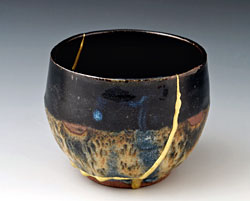
28 Feb 2017 | Focolare Worldwide
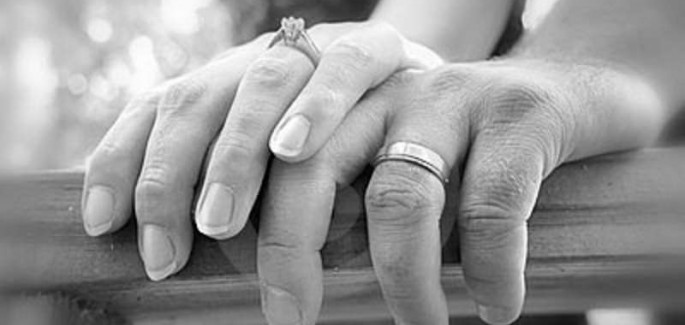 Federico: An Italian and Uruguayan: what are the chances? Yet we happened to meet, seven years ago, at a Latin American center in Rome. I was there to give a hand running things, she to speak her language a bit. Our eyes met and we started to build a home together. Economic constraints, however, pushed us to leave the big city for my parents’ small village, especially because one of our greatest wishes was about to come true: our son was on the way. There was much happiness, but the stress of the birth and the rapid life changes didn’t give us any time to breathe. Laura: As if that were not enough, my mother, who was taking care of my invalid father and my little brother, became seriously ill. I needed to immediately go to Uruguay for at least a couple of months, especially because time was running out for my mother to get to know our little one. In the meantime, Federico and I were living on two different planets: me shut in at home with the child, he always out to escape the tension between us. Whenever our eyes met there was only anger, exhaustion, misunderstanding. As I left I told him, “When I come back, we’re either going to break up or stay together forever.” Federico: Our hearts became as distant as the physical separation. The months flew by, she didn’t return, and I found myself on a different path. To be honest with her, I felt I had to tell her that I didn’t want to get back together and that perhaps she should stay there where she was. Laura: It hurt a lot, even though I expected it. I gathered my strength, put aside my suffering and decided to return to Italy, knowing that I had little chance. In fact, when I got back home, he didn’t want to hear anything about living with me. Federico: One day I confided to my brother what was happening, and he told me about a couple that had a lot of experience who could help us. The idea didn’t seem that convincing at all, but in the end, for the good of the child, I accepted. “Perhaps they can help us separate without touching off a war,” I said to myself. It was an afternoon at the end of May. In the garden where we met, the cherries were ripe, and everything spoke of hope and peace. Yet in our hearts opposing feelings were rebelling. The man’s strong handshake and the delicate face of his wife gave me shivers along my spine. I saw that Laura, too, was moved. We talked with them for a half-hour. That night I left behind everything and returned home. As I entered, tears ran down my face, but my soul seemed to fly. Maybe I could do this!
Federico: An Italian and Uruguayan: what are the chances? Yet we happened to meet, seven years ago, at a Latin American center in Rome. I was there to give a hand running things, she to speak her language a bit. Our eyes met and we started to build a home together. Economic constraints, however, pushed us to leave the big city for my parents’ small village, especially because one of our greatest wishes was about to come true: our son was on the way. There was much happiness, but the stress of the birth and the rapid life changes didn’t give us any time to breathe. Laura: As if that were not enough, my mother, who was taking care of my invalid father and my little brother, became seriously ill. I needed to immediately go to Uruguay for at least a couple of months, especially because time was running out for my mother to get to know our little one. In the meantime, Federico and I were living on two different planets: me shut in at home with the child, he always out to escape the tension between us. Whenever our eyes met there was only anger, exhaustion, misunderstanding. As I left I told him, “When I come back, we’re either going to break up or stay together forever.” Federico: Our hearts became as distant as the physical separation. The months flew by, she didn’t return, and I found myself on a different path. To be honest with her, I felt I had to tell her that I didn’t want to get back together and that perhaps she should stay there where she was. Laura: It hurt a lot, even though I expected it. I gathered my strength, put aside my suffering and decided to return to Italy, knowing that I had little chance. In fact, when I got back home, he didn’t want to hear anything about living with me. Federico: One day I confided to my brother what was happening, and he told me about a couple that had a lot of experience who could help us. The idea didn’t seem that convincing at all, but in the end, for the good of the child, I accepted. “Perhaps they can help us separate without touching off a war,” I said to myself. It was an afternoon at the end of May. In the garden where we met, the cherries were ripe, and everything spoke of hope and peace. Yet in our hearts opposing feelings were rebelling. The man’s strong handshake and the delicate face of his wife gave me shivers along my spine. I saw that Laura, too, was moved. We talked with them for a half-hour. That night I left behind everything and returned home. As I entered, tears ran down my face, but my soul seemed to fly. Maybe I could do this!  Laura: When I saw Federico come back I couldn’t believe it. Our next appointment with that couple was at Loppiano (near Florence), where we met other friends of theirs, couples who were having difficulties like us. But the change in us had already begun. At the course organized by New Families of the Focolare Movement, the first thing they talked to us about – almost like a game – was the Japanese art of kintsugi, where a broken ceramic vase is not thrown away, but glued together with gold. Doing so, it becomes even more valuable. The new atmosphere we were breathing in there was renewing us without us realizing it. We understood that forgiveness was the gold that could put us together again, and we asked it of each other. We found the strength to give of ourselves to each other. Federico: It was a mix of the spirituality of unity, which the course was based on; advice from experts; and the support from the other couples that strengthened our desire to be reborn again as a couple and gave us a fundamental push to change. Ever since, each day we tell each other that we’re ready to start again, without taking anything for granted and making the effort to step in each other’s shoes. Laura: After two years we got to the point where we were able to make an important decision: to get married in Church, so that Love par excellence could watch over our life together and continue flowing forever. Now we are expecting our second child in July. Truly the love of God knew how to write straight on our crooked lines!
Laura: When I saw Federico come back I couldn’t believe it. Our next appointment with that couple was at Loppiano (near Florence), where we met other friends of theirs, couples who were having difficulties like us. But the change in us had already begun. At the course organized by New Families of the Focolare Movement, the first thing they talked to us about – almost like a game – was the Japanese art of kintsugi, where a broken ceramic vase is not thrown away, but glued together with gold. Doing so, it becomes even more valuable. The new atmosphere we were breathing in there was renewing us without us realizing it. We understood that forgiveness was the gold that could put us together again, and we asked it of each other. We found the strength to give of ourselves to each other. Federico: It was a mix of the spirituality of unity, which the course was based on; advice from experts; and the support from the other couples that strengthened our desire to be reborn again as a couple and gave us a fundamental push to change. Ever since, each day we tell each other that we’re ready to start again, without taking anything for granted and making the effort to step in each other’s shoes. Laura: After two years we got to the point where we were able to make an important decision: to get married in Church, so that Love par excellence could watch over our life together and continue flowing forever. Now we are expecting our second child in July. Truly the love of God knew how to write straight on our crooked lines!
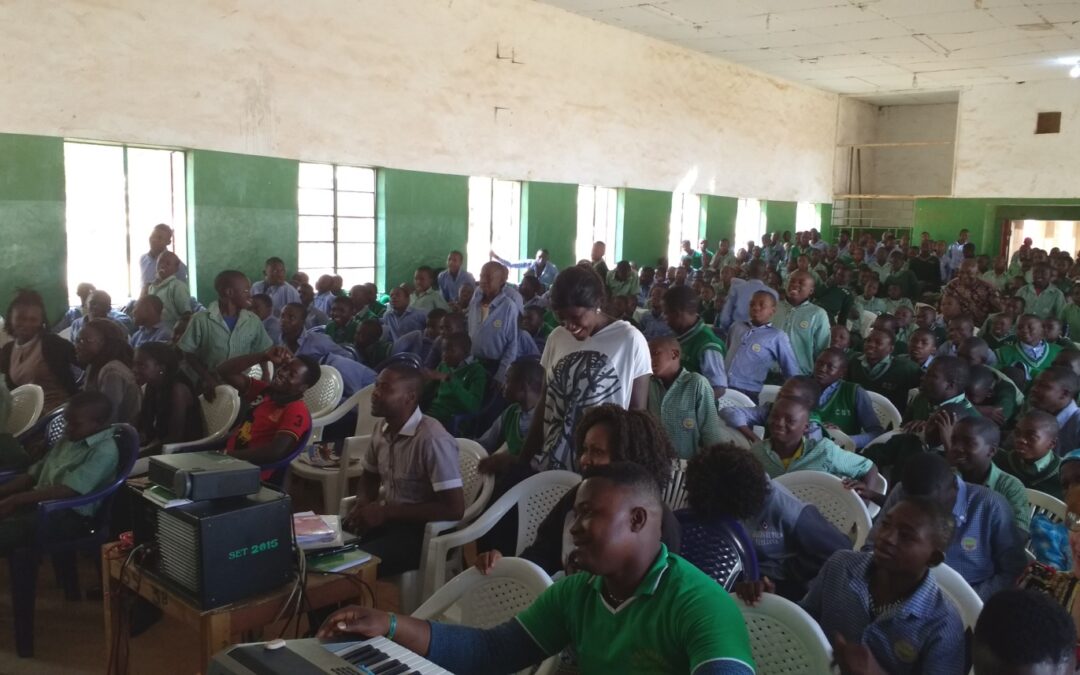
24 Feb 2017 | Focolare Worldwide
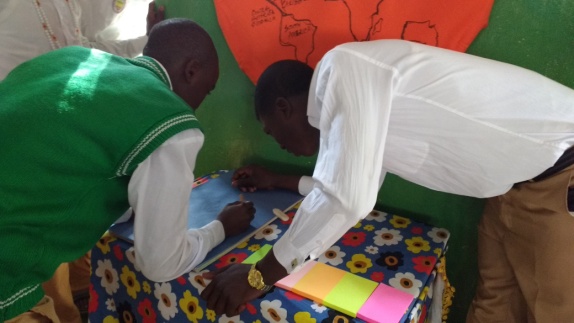 For three days, St Joseph’s College transformed into a fraternity experiment. The young students, ages 9 to 18, lived side by side with their professors, their families, as well as many other young people, adults and elderly from other cities. The Mariapolis was organised by members of the local Jos community, as well as other communities like that of Abuja (4 hours away) and Onitsa (12). There were also some young people of the Focolare from Lagos. In Nigeria, a country of seemingly limitless expanses, long trips bristling with danger often need to be overcome. Yet this did not stop anyone from supporting the Mariapolis at St. Joseph’s. The school opened its gates to welcome the young and not so young, students, teachers, workers. Among the Mariapolites was John Maigari, who had once attended and taught at the school. Now retired, Maigari also previously headed the diocese’s department of education. Many years prior he himself had experienced Mariapolis life, where each person sees each other as family to love and to serve. Now after many years, the professor hoped that the students could experience that same lifestyle. His proposal was welcomed.
For three days, St Joseph’s College transformed into a fraternity experiment. The young students, ages 9 to 18, lived side by side with their professors, their families, as well as many other young people, adults and elderly from other cities. The Mariapolis was organised by members of the local Jos community, as well as other communities like that of Abuja (4 hours away) and Onitsa (12). There were also some young people of the Focolare from Lagos. In Nigeria, a country of seemingly limitless expanses, long trips bristling with danger often need to be overcome. Yet this did not stop anyone from supporting the Mariapolis at St. Joseph’s. The school opened its gates to welcome the young and not so young, students, teachers, workers. Among the Mariapolites was John Maigari, who had once attended and taught at the school. Now retired, Maigari also previously headed the diocese’s department of education. Many years prior he himself had experienced Mariapolis life, where each person sees each other as family to love and to serve. Now after many years, the professor hoped that the students could experience that same lifestyle. His proposal was welcomed. 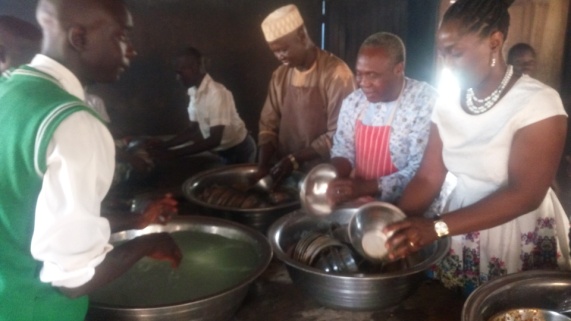 For three days, the school completely changed. Moments of reflection and going in depth were joined with tangible experiences. Divided into groups, students of different ages lived side by side with teachers and those attending, sharing the various moments of the day: cooking, washing dishes, tidying up the meeting hall, cleaning toilets and the school playground. For some it was their first time; they had never done anything like it. Even the school’s principal washed dishes! A large book was prepared for the students to capture their comments. It tells of three days of true living. The retreat changed their lives, they say. “The unity we lived during those days struck us from the very first moment that you set foot in our school.” It was a unity that the words of Chiara Lubich and the witness of the Focolare members had transmitted to them.
For three days, the school completely changed. Moments of reflection and going in depth were joined with tangible experiences. Divided into groups, students of different ages lived side by side with teachers and those attending, sharing the various moments of the day: cooking, washing dishes, tidying up the meeting hall, cleaning toilets and the school playground. For some it was their first time; they had never done anything like it. Even the school’s principal washed dishes! A large book was prepared for the students to capture their comments. It tells of three days of true living. The retreat changed their lives, they say. “The unity we lived during those days struck us from the very first moment that you set foot in our school.” It was a unity that the words of Chiara Lubich and the witness of the Focolare members had transmitted to them. 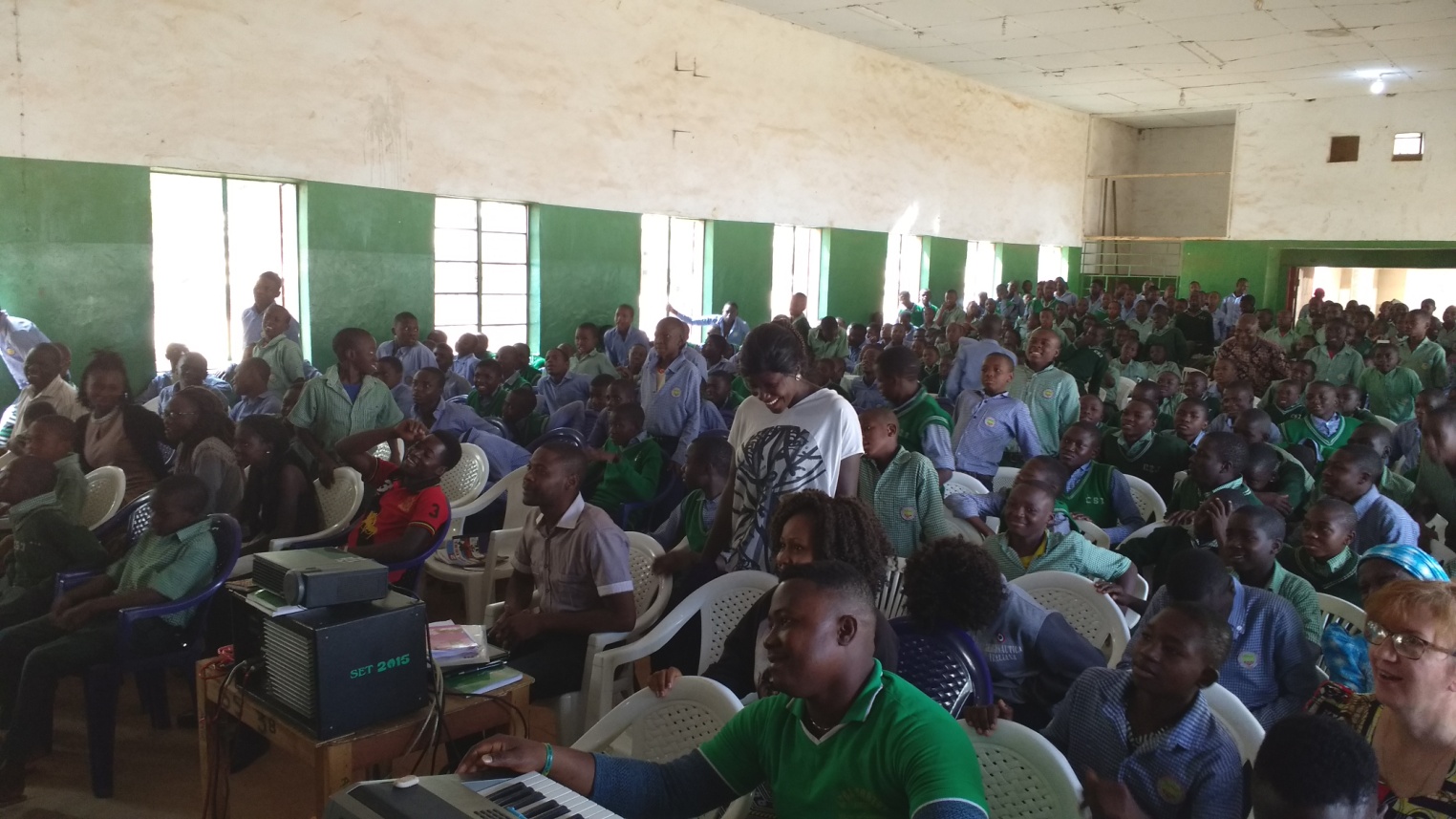 “I feel really happy and enthusiastic,” writes Nipps, “because these days were wonderful. I experienced many things and was particularly struck by the love and unity that the team of people who ran the program had between them.” “Before my life was incomplete,” says Keivin, “because I didn’t feel at all that God truly existed and was alive. Now I truly believe in God.” “This retreat wasn’t like the others,” adds Daong. “You ate with us and slept at our high school.” In this part of Nigeria, for years there have been many episodes of violence between Christians and Muslims, with seeds of hatred sown across the country. These young students also had lived through this. At the Mariapolis at Jos, they were able to experience an alternative: the firepower of God’s love and unity.
“I feel really happy and enthusiastic,” writes Nipps, “because these days were wonderful. I experienced many things and was particularly struck by the love and unity that the team of people who ran the program had between them.” “Before my life was incomplete,” says Keivin, “because I didn’t feel at all that God truly existed and was alive. Now I truly believe in God.” “This retreat wasn’t like the others,” adds Daong. “You ate with us and slept at our high school.” In this part of Nigeria, for years there have been many episodes of violence between Christians and Muslims, with seeds of hatred sown across the country. These young students also had lived through this. At the Mariapolis at Jos, they were able to experience an alternative: the firepower of God’s love and unity.
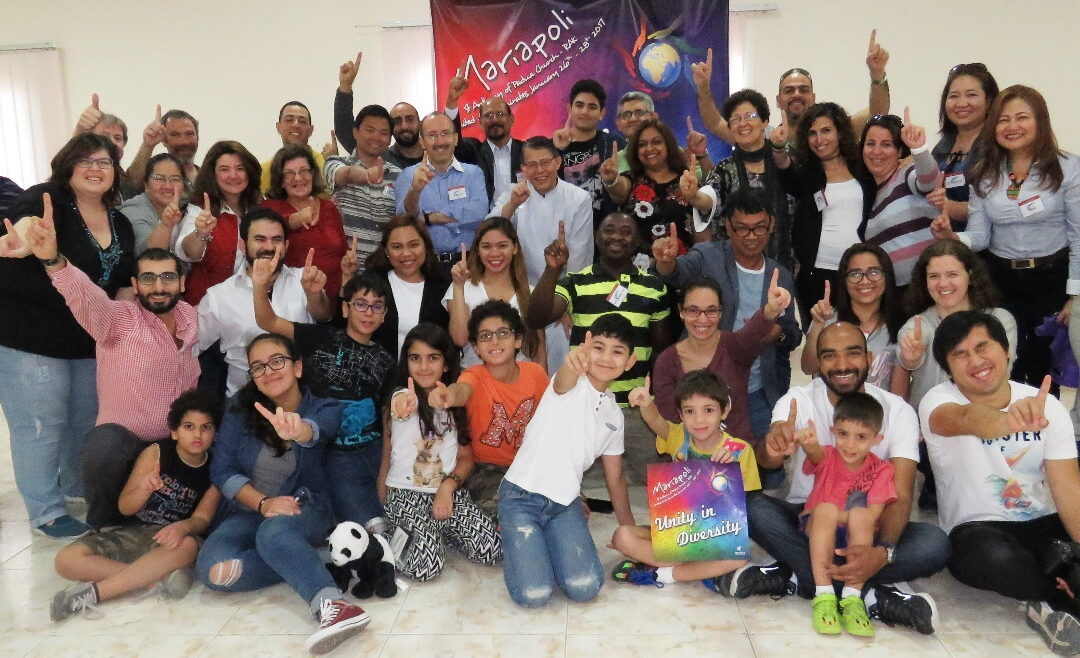
22 Feb 2017 | Focolare Worldwide
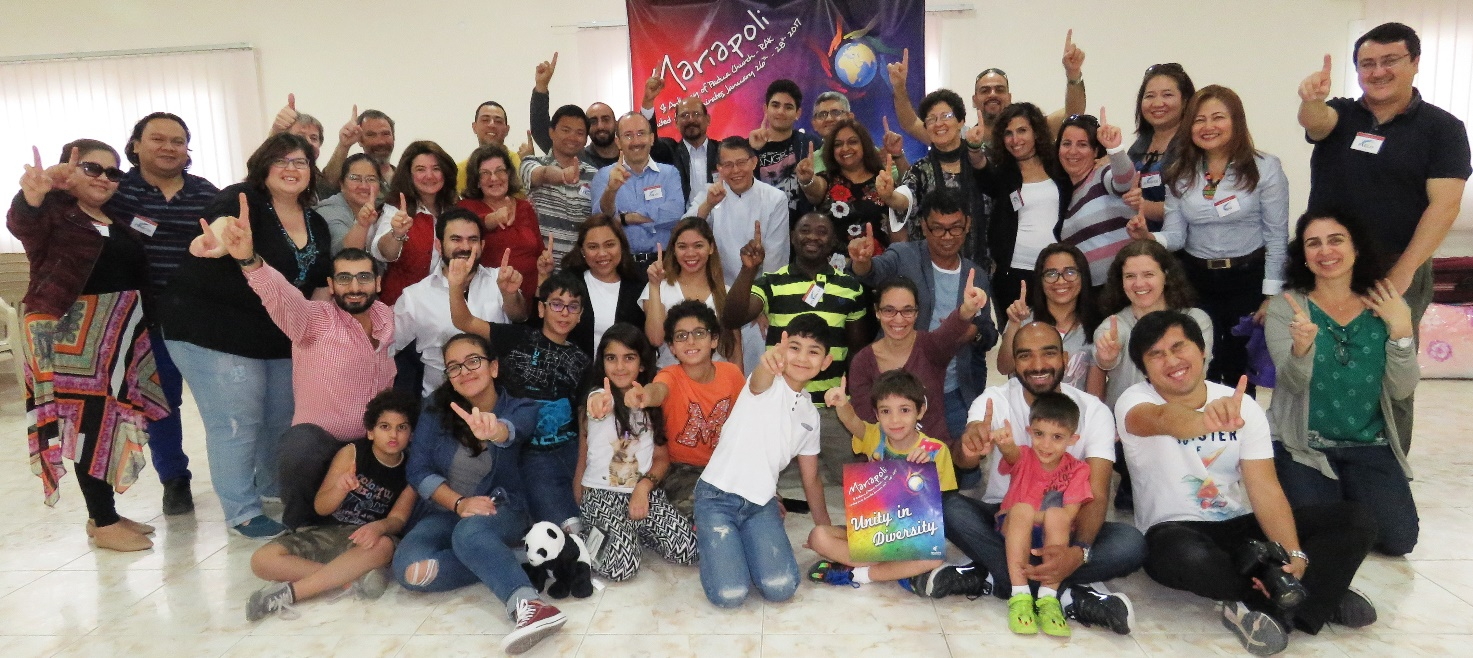 “We find ourselves here in countries of the United Arab Emirates due to work,” Claudia says. “Our workplaces are often strongly competitive, and it is difficult to integrate because there is little time for relationships that are simple and authentic. “The Catholic Church in Dubai is young, lively, joyous and not overly complicated. More than 2,000 faithful participate in and focus on daily mass – mostly from the Philippines, Pakistan and India. “Our local Focolare community is also made up mostly of migrants, and we try to give witness to the Gospel in the circles we move through, bringing love and unity around us. There are many who know about and live the spirituality of unity after first hearing about it in their home countries. We try to propose it to those whom we’re close to as a remedy to the frenetic, individualistic life here. “For us the monthly Word of Life meeting is fundamentally important. We read it together and try to go deeper into its meaning, sharing experiences that emerge from putting it into practice. “Maria Voce and Jesus Moran’s trip to India in January 2016 gave us a new drive to bring the ideal of unity to many, staying closely networked together.” “So we naturally involved all the people we’re in contact with to live the Mariapolis experience, which we took great care in preparing,” explains Amjad. “On January 27–28, 65 people from 12 countries (4 from the Middle East, the rest from Pakistan, the Philippines, Brazil, Japan, Italy and Cameroon) decided to come together at Ras Al Khaimah, an emirate near Dubai, to experience our first Mariapolis in these lands. “Emotions were running high! For some it seemed like a dream come true to finally get together after such a long time. We were welcomed by the parish of Father Willy, who is originally from the Philippines. The theme we chose, ‘Unity in diversity,’ reflected the reality and challenges that we all live through really well.” “What really struck me,” writes a young person from India,” was what we heard from Chiara Lubich about the ‘technique’ of building unity. Now I’d like to practice it.”“To discover how Jesus, in the moment he felt forsaken by the Father, can become a ‘key to unity’ in as much as I try to imitate him, filled me with hope,” said a woman from the Philippines. In a joyous atmosphere, participants were able to tell of their joys and difficulties, both in the hall and smaller groups, which is so important in order to share our lives together. There were moments to play, pray, and an intercultural evening to relax that included songs, video clips, skits and dances that involved everyone. “Special care was given to activities for the children, some of whom did not want to go back home,” says Claudia. “It was like an oasis,” explains Amjad, “where each of us found a family, with a spiritual presence of Jesus that is alive.” “During these past days, the fire of this ideal, which I got to know many years ago, was re-awakened,” confides a man from Brazil. “Now I want to give this fire to others.” Mia and Michel write: “It seemed to us that by the end, everyone returning to their countries or emirates, like Oman, Qatar, Bahrain, brought with them that ‘piece of fraternity’ that they had lived at the Mariapolis. Everyone evidently wanted to continue living this in their own environment, bringing hope to everyone. Now we keep connected through social media in a vibrant network, trying to help us live for each other, open to everyone.”
“We find ourselves here in countries of the United Arab Emirates due to work,” Claudia says. “Our workplaces are often strongly competitive, and it is difficult to integrate because there is little time for relationships that are simple and authentic. “The Catholic Church in Dubai is young, lively, joyous and not overly complicated. More than 2,000 faithful participate in and focus on daily mass – mostly from the Philippines, Pakistan and India. “Our local Focolare community is also made up mostly of migrants, and we try to give witness to the Gospel in the circles we move through, bringing love and unity around us. There are many who know about and live the spirituality of unity after first hearing about it in their home countries. We try to propose it to those whom we’re close to as a remedy to the frenetic, individualistic life here. “For us the monthly Word of Life meeting is fundamentally important. We read it together and try to go deeper into its meaning, sharing experiences that emerge from putting it into practice. “Maria Voce and Jesus Moran’s trip to India in January 2016 gave us a new drive to bring the ideal of unity to many, staying closely networked together.” “So we naturally involved all the people we’re in contact with to live the Mariapolis experience, which we took great care in preparing,” explains Amjad. “On January 27–28, 65 people from 12 countries (4 from the Middle East, the rest from Pakistan, the Philippines, Brazil, Japan, Italy and Cameroon) decided to come together at Ras Al Khaimah, an emirate near Dubai, to experience our first Mariapolis in these lands. “Emotions were running high! For some it seemed like a dream come true to finally get together after such a long time. We were welcomed by the parish of Father Willy, who is originally from the Philippines. The theme we chose, ‘Unity in diversity,’ reflected the reality and challenges that we all live through really well.” “What really struck me,” writes a young person from India,” was what we heard from Chiara Lubich about the ‘technique’ of building unity. Now I’d like to practice it.”“To discover how Jesus, in the moment he felt forsaken by the Father, can become a ‘key to unity’ in as much as I try to imitate him, filled me with hope,” said a woman from the Philippines. In a joyous atmosphere, participants were able to tell of their joys and difficulties, both in the hall and smaller groups, which is so important in order to share our lives together. There were moments to play, pray, and an intercultural evening to relax that included songs, video clips, skits and dances that involved everyone. “Special care was given to activities for the children, some of whom did not want to go back home,” says Claudia. “It was like an oasis,” explains Amjad, “where each of us found a family, with a spiritual presence of Jesus that is alive.” “During these past days, the fire of this ideal, which I got to know many years ago, was re-awakened,” confides a man from Brazil. “Now I want to give this fire to others.” Mia and Michel write: “It seemed to us that by the end, everyone returning to their countries or emirates, like Oman, Qatar, Bahrain, brought with them that ‘piece of fraternity’ that they had lived at the Mariapolis. Everyone evidently wanted to continue living this in their own environment, bringing hope to everyone. Now we keep connected through social media in a vibrant network, trying to help us live for each other, open to everyone.”
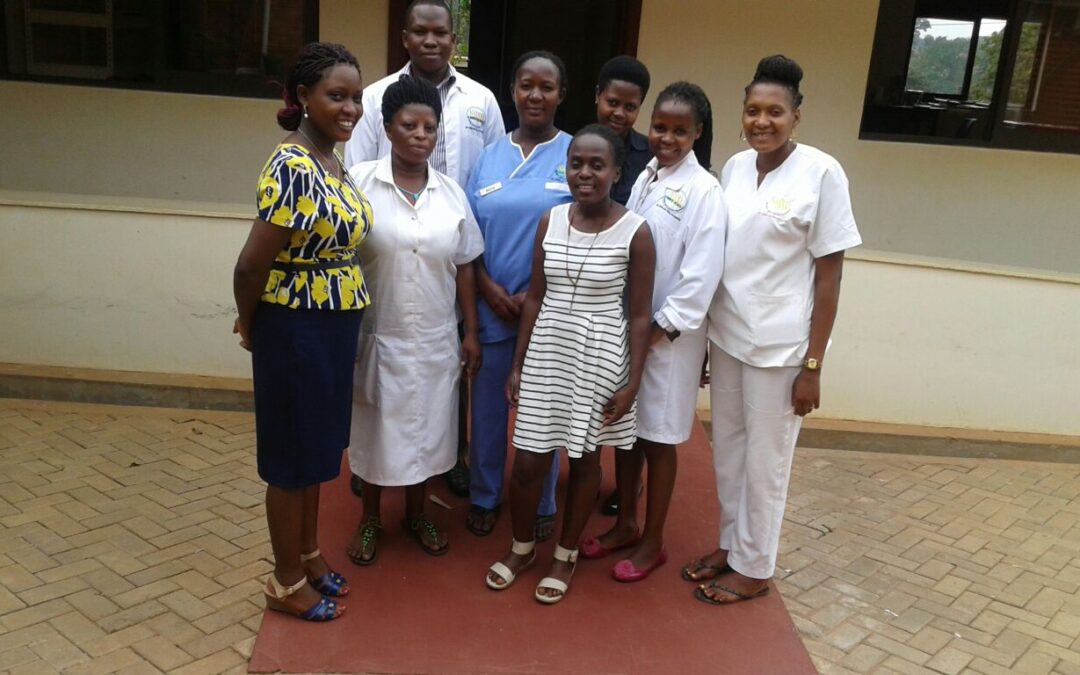
20 Feb 2017 | Focolare Worldwide
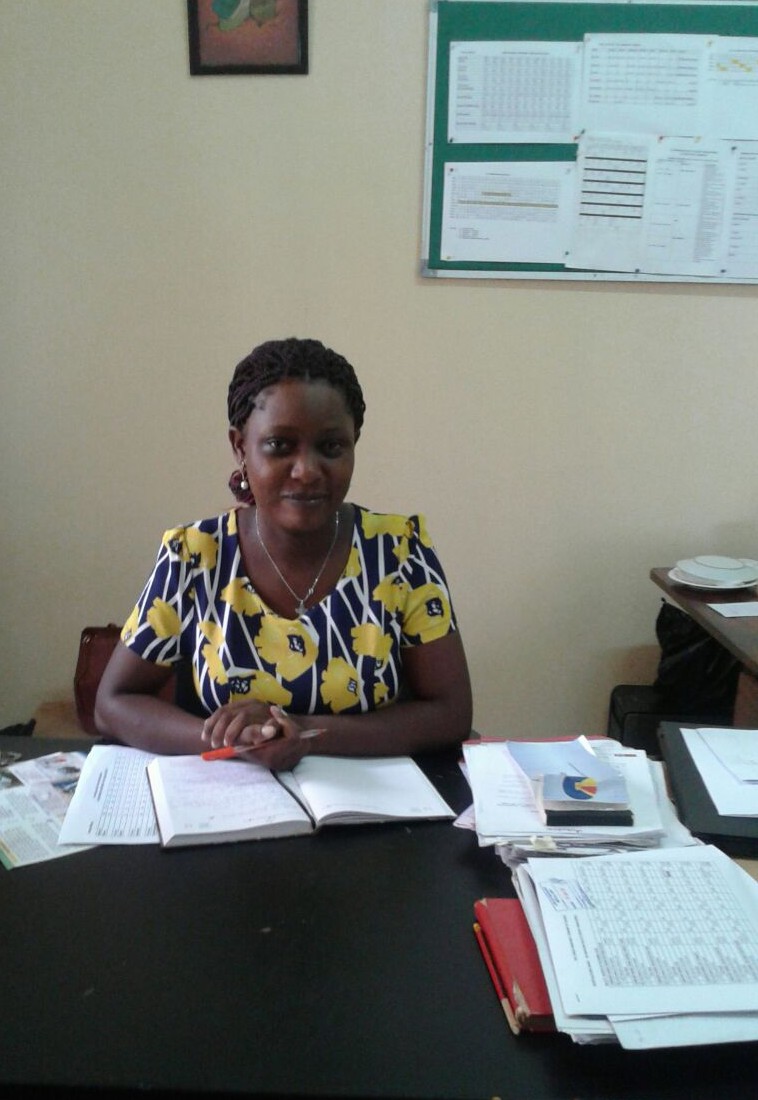 Ugandan business woman Rita Najjingo was among the 1,200 business owners and researchers of economy who were welcomed by Pope Francis on February 4, twenty five years from the start of the Economy of Communion Project (EoC). Seventy three percent of Rita’s country is made up of young people between the ages of 18 and 30, 47% of whom are unemployed. “Many of them try to set up small manufacturing activities,” Rita reports, “but because of a lack of capital and management skills, their businesses fail from start.” The idea of the EoC came to the African continent in recent years and immediately appeared as an answer. In 2015 several Ugandan entrepreneurs and researchers took part in a conference in Nairobi, Kenya, to learn about this economic project that puts the person first. When they went back to Uganda they talked with the local community and the first projects began in Ibanda, the western part of the country with a form of micro-credit that began to support a school for ex-cons; in Lira, the north, a home was built for elderly women, along with the cultivation of garlic, and so on. In Kampala,” Rita recounts, “there was the idea of involving the patients at a neary Focolare-run health centre which had a secure source of income. The idea was to be able to grant loans with their savings that they put in common, with loans for people who did not have enough capital to start up a manufacturing activity. An expert gave a week-long course and a savings and loan association was begun.
Ugandan business woman Rita Najjingo was among the 1,200 business owners and researchers of economy who were welcomed by Pope Francis on February 4, twenty five years from the start of the Economy of Communion Project (EoC). Seventy three percent of Rita’s country is made up of young people between the ages of 18 and 30, 47% of whom are unemployed. “Many of them try to set up small manufacturing activities,” Rita reports, “but because of a lack of capital and management skills, their businesses fail from start.” The idea of the EoC came to the African continent in recent years and immediately appeared as an answer. In 2015 several Ugandan entrepreneurs and researchers took part in a conference in Nairobi, Kenya, to learn about this economic project that puts the person first. When they went back to Uganda they talked with the local community and the first projects began in Ibanda, the western part of the country with a form of micro-credit that began to support a school for ex-cons; in Lira, the north, a home was built for elderly women, along with the cultivation of garlic, and so on. In Kampala,” Rita recounts, “there was the idea of involving the patients at a neary Focolare-run health centre which had a secure source of income. The idea was to be able to grant loans with their savings that they put in common, with loans for people who did not have enough capital to start up a manufacturing activity. An expert gave a week-long course and a savings and loan association was begun. 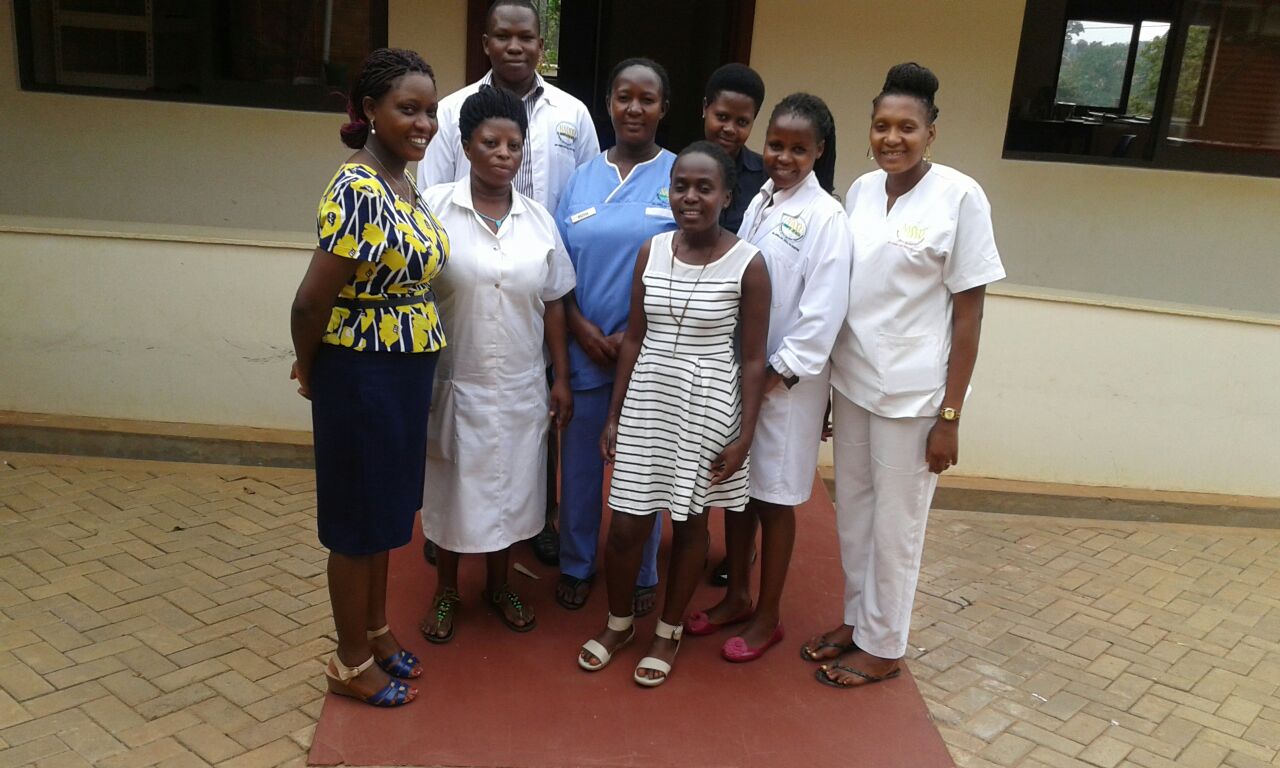 Typically the amount that is given in loan is never more than three times the capital the applican has on hand. The repayment starts after four weeks, leaving a small percentage for the increase of the share capital. Within three months, the debt is fully repaid. In granting a loan the promoter group enquires about the type of business that applicants intend to start, giving advice and accompanying them in their first steps. Over time, a group of experts in management has been formed that can also offer advice on managing, marketing and sustainability. One person asked for the loan to make handcrafted bags, another young person to buy a motorcycle he could rent out and also drive for pay, with a second loan and the sale of the old bike, he bought a more efficient one. He is now in charge of buying and selling used motorbikes, with help of two young men whom he hired. A member of the community has invested the loan in the purchase of sesame plants that are sold for various food uses. He too has been able to hire young people who help in delivery and removal of goods, thus facilitating things for manufacturers. With this loan activity, Rita continued, she was also able to create a fully registered company in charge of stationary and office supplies. After having used up the first loan, I got another to expand the business with online money transfers. Currently, I have four centres that have hired 4 young women, 3 of whom are single mothers.” A motorbike, small house, some garlic and sesame seeds . . . small signs, Pope Francis called them, in his speech to the EoC, seeds of change: “Change in the order of the spirit and therefore of life are not linked to big numbers. The little flock, the lamp, the coin, a ring, a pearl, some salt, leaven: these are the images of the Kingdom that we find in the Gospel. It doesn’t take many people to change our history, our life.” (Vatican City, February 4, 2017)
Typically the amount that is given in loan is never more than three times the capital the applican has on hand. The repayment starts after four weeks, leaving a small percentage for the increase of the share capital. Within three months, the debt is fully repaid. In granting a loan the promoter group enquires about the type of business that applicants intend to start, giving advice and accompanying them in their first steps. Over time, a group of experts in management has been formed that can also offer advice on managing, marketing and sustainability. One person asked for the loan to make handcrafted bags, another young person to buy a motorcycle he could rent out and also drive for pay, with a second loan and the sale of the old bike, he bought a more efficient one. He is now in charge of buying and selling used motorbikes, with help of two young men whom he hired. A member of the community has invested the loan in the purchase of sesame plants that are sold for various food uses. He too has been able to hire young people who help in delivery and removal of goods, thus facilitating things for manufacturers. With this loan activity, Rita continued, she was also able to create a fully registered company in charge of stationary and office supplies. After having used up the first loan, I got another to expand the business with online money transfers. Currently, I have four centres that have hired 4 young women, 3 of whom are single mothers.” A motorbike, small house, some garlic and sesame seeds . . . small signs, Pope Francis called them, in his speech to the EoC, seeds of change: “Change in the order of the spirit and therefore of life are not linked to big numbers. The little flock, the lamp, the coin, a ring, a pearl, some salt, leaven: these are the images of the Kingdom that we find in the Gospel. It doesn’t take many people to change our history, our life.” (Vatican City, February 4, 2017)

 The solidarity tourism project that the Ministry of Tourism of Salta, Argentina has been promoting for six years supports small communities in the cities of Salta, Jujuy and Catamarca in the north of the country. It is enhancing the region’s natural resources in order to save the cultural richness and diversity that is linked to local history. At the same time, it offers professional training for the production of products related to the sectors of tourism, housing, transport and the sale of handicrafts and food products (jams, liqueurs, honey, and more). This has helped to avoid the migration of populations from rural areas to urban ones, preventing the increase of poverty areas in the big cities while protecting small communities that have a rich culture that is disappearing.
The solidarity tourism project that the Ministry of Tourism of Salta, Argentina has been promoting for six years supports small communities in the cities of Salta, Jujuy and Catamarca in the north of the country. It is enhancing the region’s natural resources in order to save the cultural richness and diversity that is linked to local history. At the same time, it offers professional training for the production of products related to the sectors of tourism, housing, transport and the sale of handicrafts and food products (jams, liqueurs, honey, and more). This has helped to avoid the migration of populations from rural areas to urban ones, preventing the increase of poverty areas in the big cities while protecting small communities that have a rich culture that is disappearing.  “What distinguishes this experience of development from other types of experiences,” sociologist Virginia Osorio from the Sumá Fraternidad explains, “are the words “communion” and “dialogue”. Communion, because each actor has put his or her own talents and resources in common for the development of the project; dialogue, because throughout the development process, there was strong interaction between the different components who were often in conflict with one another. Difficulties were never lacking, but the strategy used to overcome those difficulties was to work in squads and practice active listening among parties: the local community, the State, businesses and other types of civil organisations.” She went on to say: “The result of this experience has been the birth of a new product and of a new kind of consumer. It’s not the idea of tourism that we have been used to. In this experience there is the added value of contact with the rich cultural wealth of small rural communities and, in several cases, of the descendents of indigenousness peoples. This type of tourism creates encounter among people among people.”
“What distinguishes this experience of development from other types of experiences,” sociologist Virginia Osorio from the Sumá Fraternidad explains, “are the words “communion” and “dialogue”. Communion, because each actor has put his or her own talents and resources in common for the development of the project; dialogue, because throughout the development process, there was strong interaction between the different components who were often in conflict with one another. Difficulties were never lacking, but the strategy used to overcome those difficulties was to work in squads and practice active listening among parties: the local community, the State, businesses and other types of civil organisations.” She went on to say: “The result of this experience has been the birth of a new product and of a new kind of consumer. It’s not the idea of tourism that we have been used to. In this experience there is the added value of contact with the rich cultural wealth of small rural communities and, in several cases, of the descendents of indigenousness peoples. This type of tourism creates encounter among people among people.”  Stefano, a young Italian tourist who participated in the programme, reports: “I feel like for some people travelling is like looking at the world from a glass box. We travel in search of our Western standard, with our comforts, our certainties and securities. We go to “consume,” as if visiting places was like stopping to have a drink and then throwing the cup away. Many photos are taken, many souvenirs are bought, you eat at some local eatery and the game is over! A nation is not made of monuments and souvenirs, but of people that can offer hospitality, sharing their homes, their dinner tables, their music: this is the real way to travel! ‘Share’, Argentina!” The family of María José e Pablo from Argentina recount: “We liked this idea of vacation, taking walks, getting to know sites, but most of all the opportunity to meet these ‘human sites’ that at times are hidden in the background of the postcards … which allowed us to enter into the local reality of those communities. We had the strong feeling throughout this experience of breaking free from our scheme of things and filling our life with those people whom we now hold in our heart; experiencing the profound and tranquil rhythm of those places, and the scenery of many places we passed through on our trip. Now, as we return to the city, we look at daily life differently, with new eyes.”
Stefano, a young Italian tourist who participated in the programme, reports: “I feel like for some people travelling is like looking at the world from a glass box. We travel in search of our Western standard, with our comforts, our certainties and securities. We go to “consume,” as if visiting places was like stopping to have a drink and then throwing the cup away. Many photos are taken, many souvenirs are bought, you eat at some local eatery and the game is over! A nation is not made of monuments and souvenirs, but of people that can offer hospitality, sharing their homes, their dinner tables, their music: this is the real way to travel! ‘Share’, Argentina!” The family of María José e Pablo from Argentina recount: “We liked this idea of vacation, taking walks, getting to know sites, but most of all the opportunity to meet these ‘human sites’ that at times are hidden in the background of the postcards … which allowed us to enter into the local reality of those communities. We had the strong feeling throughout this experience of breaking free from our scheme of things and filling our life with those people whom we now hold in our heart; experiencing the profound and tranquil rhythm of those places, and the scenery of many places we passed through on our trip. Now, as we return to the city, we look at daily life differently, with new eyes.”





 Federico: An Italian and Uruguayan: what are the chances? Yet we happened to meet, seven years ago, at a Latin American center in Rome. I was there to give a hand running things, she to speak her language a bit. Our eyes met and we started to build a home together. Economic constraints, however, pushed us to leave the big city for my parents’ small village, especially because one of our greatest wishes was about to come true: our son was on the way. There was much happiness, but the stress of the birth and the rapid life changes didn’t give us any time to breathe. Laura: As if that were not enough, my mother, who was taking care of my invalid father and my little brother, became seriously ill. I needed to immediately go to
Federico: An Italian and Uruguayan: what are the chances? Yet we happened to meet, seven years ago, at a Latin American center in Rome. I was there to give a hand running things, she to speak her language a bit. Our eyes met and we started to build a home together. Economic constraints, however, pushed us to leave the big city for my parents’ small village, especially because one of our greatest wishes was about to come true: our son was on the way. There was much happiness, but the stress of the birth and the rapid life changes didn’t give us any time to breathe. Laura: As if that were not enough, my mother, who was taking care of my invalid father and my little brother, became seriously ill. I needed to immediately go to 

 For three days, the school completely changed. Moments of reflection and going in depth were joined with tangible experiences. Divided into groups, students of different ages lived side by side with teachers and those attending, sharing the various moments of the day: cooking, washing dishes, tidying up the meeting hall, cleaning toilets and the school playground. For some it was their first time; they had never done anything like it. Even the school’s principal washed dishes! A large book was prepared for the students to capture their comments. It tells of three days of true living. The retreat changed their lives, they say. “The unity we lived during those days struck us from the very first moment that you set foot in our school.” It was a unity that the words of
For three days, the school completely changed. Moments of reflection and going in depth were joined with tangible experiences. Divided into groups, students of different ages lived side by side with teachers and those attending, sharing the various moments of the day: cooking, washing dishes, tidying up the meeting hall, cleaning toilets and the school playground. For some it was their first time; they had never done anything like it. Even the school’s principal washed dishes! A large book was prepared for the students to capture their comments. It tells of three days of true living. The retreat changed their lives, they say. “The unity we lived during those days struck us from the very first moment that you set foot in our school.” It was a unity that the words of 

 “We find ourselves here in countries of the United Arab Emirates due to work,” Claudia says. “Our workplaces are often strongly competitive, and it is difficult to integrate because there is little time for relationships that are simple and authentic. “The Catholic Church in Dubai is young, lively, joyous and not overly complicated. More than 2,000 faithful participate in and focus on daily mass – mostly from the Philippines, Pakistan and India. “Our local Focolare community is also made up mostly of migrants, and we try to give witness to the Gospel in the circles we move through, bringing love and unity around us. There are many who know about and live the
“We find ourselves here in countries of the United Arab Emirates due to work,” Claudia says. “Our workplaces are often strongly competitive, and it is difficult to integrate because there is little time for relationships that are simple and authentic. “The Catholic Church in Dubai is young, lively, joyous and not overly complicated. More than 2,000 faithful participate in and focus on daily mass – mostly from the Philippines, Pakistan and India. “Our local Focolare community is also made up mostly of migrants, and we try to give witness to the Gospel in the circles we move through, bringing love and unity around us. There are many who know about and live the 
 Ugandan business woman Rita Najjingo was among the 1,200 business owners and researchers of economy who were welcomed by Pope Francis on February 4, twenty five years from the start of the
Ugandan business woman Rita Najjingo was among the 1,200 business owners and researchers of economy who were welcomed by Pope Francis on February 4, twenty five years from the start of the 